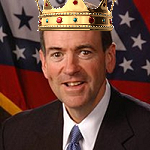Why do conservatives have to be so fatalist?
I mean what's so justified about proclaiming oneself to be entitled to social status just out of practical tradition, and saying that if people identify with being treated with respect based on who they are on the inside that counts, then they have to prove themselves? They insist on denying the value of rational thought from free will, but instead, insist that human nature is an emotionally judgmental beast, so they're entitled to be anti-intellectually stuck in their ways.
You don't just have to listen to conservatives in common conversation to pick up on this either: http://thephilosophyofscience.wordpress ... on-popper/
Popper once wrote about the value of an "open society", but Strauss and Voegelin made a mockery of him because of accusing him of being naive. They basically argued that folk community common sense was everything, and that anyone who insisted on denying this in the name of universal individuality would get bullied by rugged individualists who literally force them to stand up for what they believe in despite being weak and unpopular against the wave of social paranoia.
It's not just in social status either. It's in free markets too. That is conservatives insist on denying the value of intellectual regulation because they view work ethic as being the emotionally guided fate of whether people become wealthy or not. Those who perform good works to the satisfaction of others' feelings are entitled to become wealthy, but those who honestly apply themselves to become successful are obligated to endure having credit taken from them and labeled as selfish although they're really not.
In essence, conservatives are fatalist because they insist on calling those who believe in free will "totalitarian". They insist on social progress being slow, and that those who apply themselves to become successful are bringing about the endtimes. This is despite how conservatives themselves are actually totalitarian because they insist on words only having practical meaning such that the very definition of knowledge itself becomes political. Knowledge becomes appreciated only if it's in the self-interest of the powerful status quo rather than recognizing the diversity of applications that knowledge can be applied towards.
On Fatalist Conservatives
5 posts
• Page 1 of 1
Re: On Fatalist Conservatives
What do conservatives do that is fatalistic?
Nor Ca., Land of the lost.
-

Mogli - Congressman
- Posts: 590
- Joined: Wed Nov 13, 2013 11:29 am
- Location: Northern Ca.
- Gender:

- Has thanked: 220 times
- Been thanked: 28 times
- Political Leaning: Libertarian
Re: On Fatalist Conservatives
Nor Ca., Land of the lost.
-

Mogli - Congressman
- Posts: 590
- Joined: Wed Nov 13, 2013 11:29 am
- Location: Northern Ca.
- Gender:

- Has thanked: 220 times
- Been thanked: 28 times
- Political Leaning: Libertarian
Re: On Fatalist Conservatives

go ahead. keep screaming "Shut The f**k Up " at me. it only makes my opinions Worse
-

Philly - Governor
- Posts: 9899
- Joined: Sat Feb 22, 2014 6:36 pm
- Gender:

- Has thanked: 975 times
- Been thanked: 1223 times
- Political Leaning: DEMOCRATIC SOCIALIST
Re: On Fatalist Conservatives
I never said free will is totalitarian.
I said conservatives believe free will is totalitarian. The idea is to conserve the status quo of social status such that those who think creatively are oppressed and expected to fall in line.
I said conservatives believe free will is totalitarian. The idea is to conserve the status quo of social status such that those who think creatively are oppressed and expected to fall in line.
- Nolidor
- Citizen
- Posts: 26
- Joined: Wed Apr 23, 2014 1:54 am
- Gender:

- Has thanked: 0 time
- Been thanked: 2 times
5 posts
• Page 1 of 1
Who is online
Users browsing this forum: No registered users and 1 guest
